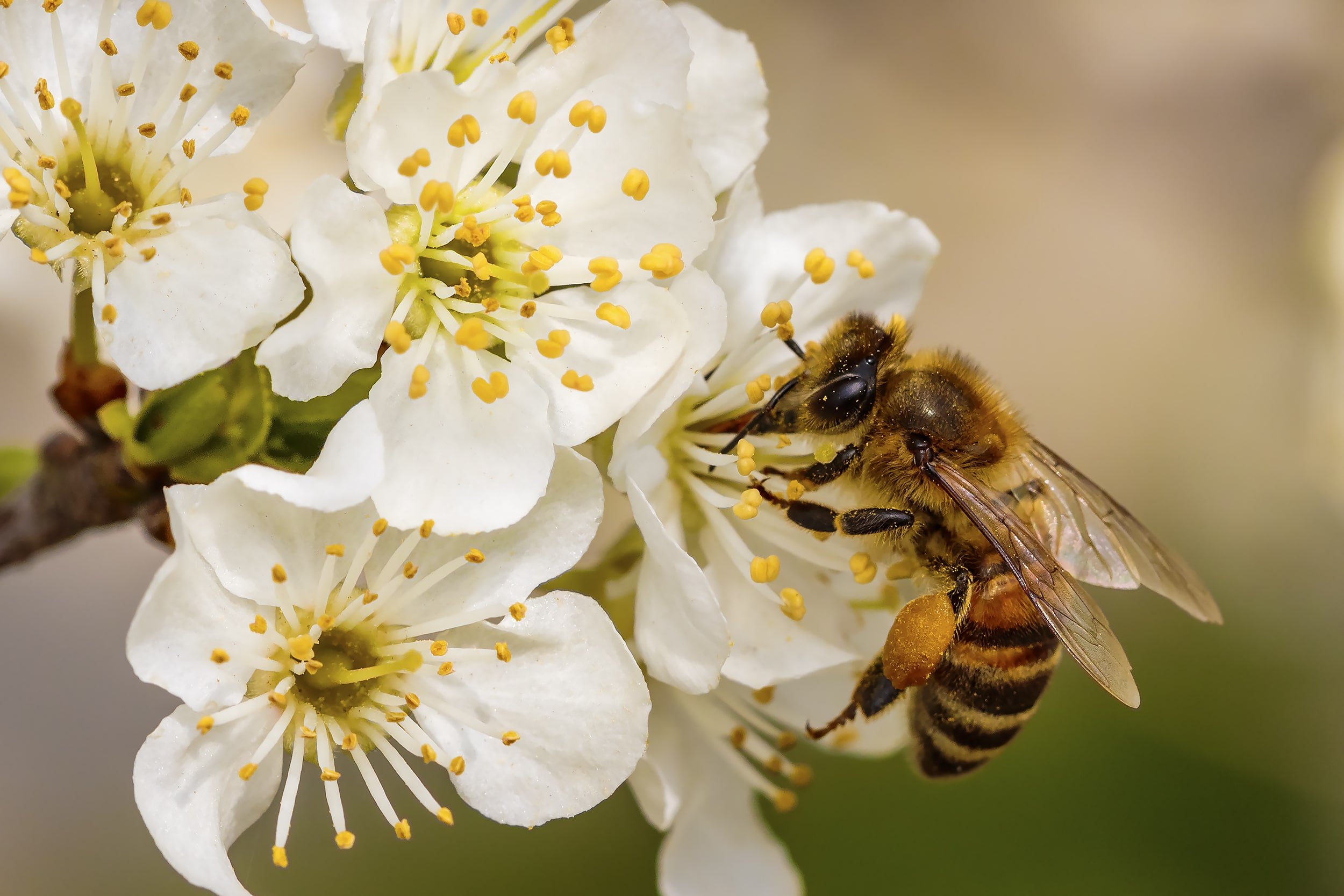There’s a distant buzz, then a whizz overhead. Finally, it comes into view as it lands on a blossoming flower. It’s a honey bee hard at work, collecting pollen from the plants and wildflowers that line the trail. You watch as it meticulously gathers the precious yellow dust, tucks it behind its knees, and bustles over to the next source.
Honey bees are a keystone species, playing a significant role in the survival of a wide range of Earth’s flora and fauna. These bees are blessings and play a significant role in the survival of so many of Earth’s creatures. When you want to know if your local area is thriving, look for the honey bee. Our little busy neighbors do more than just pollinate your backyard gardens, they can indicate the health of an entire ecosystem.
Yet, honey bee populations are taking a sharp decline that’s raising concern from environmentalists, bee lovers, farmers, and economists alike. There are an estimated 2.9 million honey bee colonies across America. North Carolina is home to up to 120,000 of those colonies. Since 2018, the national honey bee population has been reduced by 40 percent and will remain under fire without addressing the culprits of these bee deaths.
Dr. David Tarpy, professor of entomology and plant pathology at NC State University and extension apiculturist, explains that although the honey bee population, or any bee species for that matter, falls in the winter, the colonies will “regenerate” in the spring as new bees are born into the hive.
Unfortunately, this does not take away from the looming attacks from human and environmental sources. For those who take a special interest in honey bees and preserving their existence, Tarpy suggests starting with the basics.
“Understand what is a honey bee and what is not a honey bee and what is a wasp or beneficial bee.” says Tarpy, “provide habitat for all bees, plant pollen and nectar-bearing plants-things that bloom throughout the year, especially through the height of the summer. Honey bees love zinnias!”
Honey bees, like most other bees, take responsibility for pollinating our farmland and other vegetation. Pollinator dependent crops rely on bees to gather pollen from flowering infant plants in order to reproduce. Many of these plants, such as cotton, apples, and blueberries, are major cash crops in North Carolina’s economy and most commonly fall under honey bee jurisdiction since these plants are native to the bee’s habitat.
These little workers can increase the nutritional density of foods as they transfer pollen from one plant species to another. This also leads to providing food for farm animals and other critters that thrive on foraging for plant life. In order to allow for new growth, plants depend on honey bee pollination to produce seeds, which sprout forth in the ovule of the plant once pollen comes in contact with the stigma. Forest regeneration is also supported through this process and is one of the most honorable services a honey bee performs for our planet.
And still, honey bees continue to give. Honey bees make their own kind of gold called propolis, which can be extracted from the hive to combat allergies and soothe aching joints. And, of course, raw local honey has tremendous antimicrobial properties that can boost the immune system and support the gut.
The emergence of the Varroa mite has become a formidable assassin that wreaks havoc on the microbiome of honey bees. But there is hope for a counterattack against this parasite as scientists are developing a bacterial treatment for the bees.
Yet, the more pressing matters originate from man-made threats to the honey bees. There are major factors that are contributing to the decline, the first of which being the ever-popular use of pesticides. Farmers who spray pesticides on their crops are exposing all bees, not just honey bees, to harmful chemicals that are toxic to their bodies. Just one incident of pesticide exposure: decimation. Entire colonies are gone in as little as 24 hours, bee skeletons hitting the ground like raindrops. Near constant habitat destruction continues to decrease access to food sites and fragment honey bee colonies, forcing a search for new sources of nectar, thus leading to migration elsewhere.
Luckily, honey bees do have human cheerleaders. In 2019, Senators Mike Woodard (D), Valerie Foushee (D), Natasha Marcus (D), and Mujtaba Mohammed (D) of North Carolina’s Senate, sponsored a bill called The Pollinator Protection Act (S496). The bill demanded more restrictions on insecticides, called neonicotinoids.
Neonicotinoids directly impact the nervous system, resulting in nerve synapse damage and paralysis to unsuspecting insects and pollinators who come in contact with treated plant parts. In one respect, researchers argue that simply following bottle labels of neonicotinoid products is “safe” and will not likely result in any environmental threat, yet thirteen countries as of 2018 have banned neonicotinoids. As to the bill addressing this dangerous compound, the effort was short-lived as the bill failed to be heard in the Senate and House committees. Any further legislation must be done at the 2021 session.
Various states from coast to coast have already implemented laws, many establishing habitat protection, outlawing certain pesticides, or raising awareness for beekeeping. On the federal level, there are few regulations that safeguard honey bees, but as of January 2020, the EPA is working to move legislation forward that outlaws a number of pesticides and neonicotinoids that harm bee populations.
If you want to get involved and help protect the honey bees, you can do so in whatever means that you are capable of. Writing your local lawmakers, growing bee-friendly plants in your garden, or simply raising awareness for honey bee importance, protection, and celebration can spark change. We could all benefit from Dr. Tarpy’s suggestion of remaining “api-curious”, which is a friendly invitation to learn how to differentiate between bee species and understand how to support the honey bee.
Tarpy reminds all who are able, “support local beekeeping communities, beekeepers are on the front lines of this issue”. If you want to jump in on the action, round up your fellow honey bee enthusiasts to keep our state insect thriving.
Photo of bee collecting pollen courtesy of Getty Images








